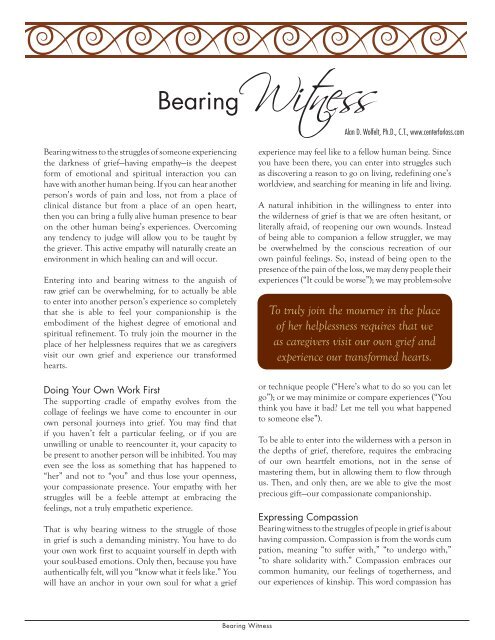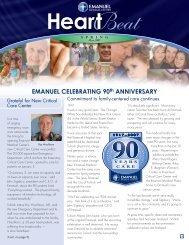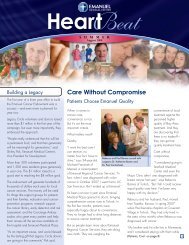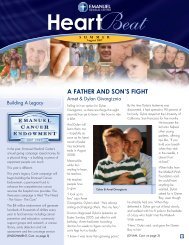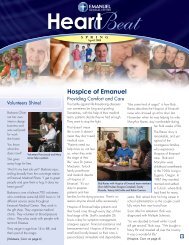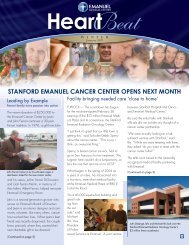to view handouts from the February - CA
to view handouts from the February - CA
to view handouts from the February - CA
You also want an ePaper? Increase the reach of your titles
YUMPU automatically turns print PDFs into web optimized ePapers that Google loves.
Bearing witness <strong>to</strong> <strong>the</strong> struggles of someone experiencing<br />
<strong>the</strong> darkness of grief—having empathy—is <strong>the</strong> deepest<br />
form of emotional and spiritual interaction you can<br />
have with ano<strong>the</strong>r human being. If you can hear ano<strong>the</strong>r<br />
person’s words of pain and loss, not <strong>from</strong> a place of<br />
clinical distance but <strong>from</strong> a place of an open heart,<br />
<strong>the</strong>n you can bring a fully alive human presence <strong>to</strong> bear<br />
on <strong>the</strong> o<strong>the</strong>r human being’s experiences. Overcoming<br />
any tendency <strong>to</strong> judge will allow you <strong>to</strong> be taught by<br />
<strong>the</strong> griever. This active empathy will naturally create an<br />
environment in which healing can and will occur.<br />
Entering in<strong>to</strong> and bearing witness <strong>to</strong> <strong>the</strong> anguish of<br />
raw grief can be overwhelming, for <strong>to</strong> actually be able<br />
<strong>to</strong> enter in<strong>to</strong> ano<strong>the</strong>r person’s experience so completely<br />
that she is able <strong>to</strong> feel your companionship is <strong>the</strong><br />
embodiment of <strong>the</strong> highest degree of emotional and<br />
spiritual refinement. To truly join <strong>the</strong> mourner in <strong>the</strong><br />
place of her helplessness requires that we as caregivers<br />
visit our own grief and experience our transformed<br />
hearts.<br />
Doing Your Own Work First<br />
The supporting cradle of empathy evolves <strong>from</strong> <strong>the</strong><br />
collage of feelings we have come <strong>to</strong> encounter in our<br />
own personal journeys in<strong>to</strong> grief. You may find that<br />
if you haven’t felt a particular feeling, or if you are<br />
unwilling or unable <strong>to</strong> reencounter it, your capacity <strong>to</strong><br />
be present <strong>to</strong> ano<strong>the</strong>r person will be inhibited. You may<br />
even see <strong>the</strong> loss as something that has happened <strong>to</strong><br />
“her” and not <strong>to</strong> “you” and thus lose your openness,<br />
your compassionate presence. Your empathy with her<br />
struggles will be a feeble attempt at embracing <strong>the</strong><br />
feelings, not a truly empa<strong>the</strong>tic experience.<br />
That is why bearing witness <strong>to</strong> <strong>the</strong> struggle of those<br />
in grief is such a demanding ministry. You have <strong>to</strong> do<br />
your own work first <strong>to</strong> acquaint yourself in depth with<br />
your soul-based emotions. Only <strong>the</strong>n, because you have<br />
au<strong>the</strong>ntically felt, will you “know what it feels like.” You<br />
will have an anchor in your own soul for what a grief<br />
BearingW i tn e ss<br />
Bearing Witness<br />
Alan D. Wolfelt, Ph.D., C.T., www.centerforloss.com<br />
experience may feel like <strong>to</strong> a fellow human being. Since<br />
you have been <strong>the</strong>re, you can enter in<strong>to</strong> struggles such<br />
as discovering a reason <strong>to</strong> go on living, redefining one’s<br />
world<strong>view</strong>, and searching for meaning in life and living.<br />
A natural inhibition in <strong>the</strong> willingness <strong>to</strong> enter in<strong>to</strong><br />
<strong>the</strong> wilderness of grief is that we are often hesitant, or<br />
literally afraid, of reopening our own wounds. Instead<br />
of being able <strong>to</strong> companion a fellow struggler, we may<br />
be overwhelmed by <strong>the</strong> conscious recreation of our<br />
own painful feelings. So, instead of being open <strong>to</strong> <strong>the</strong><br />
presence of <strong>the</strong> pain of <strong>the</strong> loss, we may deny people <strong>the</strong>ir<br />
experiences (“It could be worse”); we may problem-solve<br />
To truly join <strong>the</strong> mourner in <strong>the</strong> place<br />
of her helplessness requires that we<br />
as caregivers visit our own grief and<br />
experience our transformed hearts.<br />
or technique people (“Here’s what <strong>to</strong> do so you can let<br />
go”); or we may minimize or compare experiences (“You<br />
think you have it bad? Let me tell you what happened<br />
<strong>to</strong> someone else”).<br />
To be able <strong>to</strong> enter in<strong>to</strong> <strong>the</strong> wilderness with a person in<br />
<strong>the</strong> depths of grief, <strong>the</strong>refore, requires <strong>the</strong> embracing<br />
of our own heartfelt emotions, not in <strong>the</strong> sense of<br />
mastering <strong>the</strong>m, but in allowing <strong>the</strong>m <strong>to</strong> flow through<br />
us. Then, and only <strong>the</strong>n, are we able <strong>to</strong> give <strong>the</strong> most<br />
precious gift—our compassionate companionship.<br />
Expressing Compassion<br />
Bearing witness <strong>to</strong> <strong>the</strong> struggles of people in grief is about<br />
having compassion. Compassion is <strong>from</strong> <strong>the</strong> words cum<br />
pation, meaning “<strong>to</strong> suffer with,” “<strong>to</strong> undergo with,”<br />
“<strong>to</strong> share solidarity with.” Compassion embraces our<br />
common humanity, our feelings of <strong>to</strong>ge<strong>the</strong>rness, and<br />
our experiences of kinship. This word compassion has


